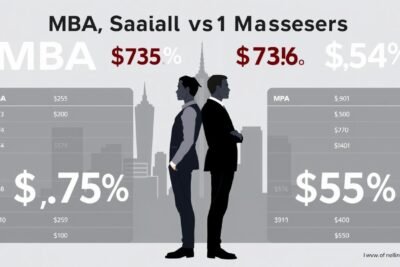
Graduate Salary Expectations: Insights for Canada's Business & Finance

Imagine your first interview in Toronto. You walk in nervous but prepared, clutching a portfolio and a list of questions. The hiring manager asks about your goals, and you try to translate numbers into a plan.
That moment is where this guide begins. You’ll get clear, data-backed insights so you can move from guessing to planning.
We break down typical starting ranges, from entry roles into more senior tracks, and show how a degree, a focused skill set, and extra time on projects move the needle.
Explore high-demand careers, salary insights, required skills, and full step-by-step pathways to grow your professional future.
Explore Careers Guide →Expect practical takeaways: benchmark figures, job examples, and how bonuses or city differences change offers. You’ll learn which skills raise your value and how to present them in interviews.
Read on to turn raw data into smart career moves you can use from day one.
- Why your graduate salary expectations in Canada’s business and finance sector matter right now
- Quick snapshot: average salary ranges for new Canadian business graduates
- graduate salary expectations Canada business finance
- How degree type shifts your earning power from day one
- Role-by-role breakdown: where salaries start and how they scale
- Entry-level finance jobs in Canada: what you can expect to earn
- City impact: Toronto, Vancouver, Calgary vs smaller markets for MBA and business grads
- Timeline of growth: what you could earn at five, ten, and fifteen years
- UBC Sauder MiM salary insights: averages, sectors, and locations
- Skills that move the needle: strategic thinking, data literacy, and leadership
- Market-savvy moves: using salary data to negotiate and plan your next step
- Choosing the right path: MBA vs MiM vs certifications for ROI
- Your next best step: turn salary insights into a career growth plan
Why your graduate salary expectations in Canada’s business and finance sector matter right now
Your opening pay offer shapes more than your bank balance; it frames the path ahead. What you accept at the start sets a base for raises, bonuses, and equity. For many undergrad hires that base sits near $45,000–$65,000, while MBA starters often see $80,000–$120,000 in top sectors.

Knowing current data helps you compare offers across industries and cities. Toronto, Vancouver, and Calgary typically lead pay bands. Smaller centres often pay less but may give better cost-of-living value.
Being informed also boosts credibility in interviews and negotiations. Align your targets with your education, skills and the location you want. That makes it easier to spot higher-paying opportunities and management tracks that match your long-term career growth.
- Start high enough: your first pay compounds over time.
- Use benchmarks: filter jobs and focus on roles that fit your value.
- Bring data: employers respect informed professionals.
Quick snapshot: average salary ranges for new Canadian business graduates
Let’s map the typical entry pay ranges so you can spot competitive offers fast. Use these figures as a starting point when you review an offer or plan your job search.

Core benchmarks: many early-career roles sit in a practical band of $45,000–$65,000. In the present market, entry-level finance roles average about $57,660, which helps you judge whether an offer is fair for your location and degree.
- Analysts and accounting entry roles: typically $45,000–$65,000, higher in major cities.
- Marketing and sales starters: usually $45,000–$55,000 with upside from incentives.
- Operations/supply chain entry roles: commonly $54,000–$65,000 due to steady demand across industries.
How your earnings compare to the national average
Compare offers to the average salary to see where your earnings sit in the market. If your job is below the benchmark, highlight internships, projects, or technical skills to push toward the mid or upper band.
| Role | Typical range | Average | Notes |
|---|---|---|---|
| Entry-level finance analyst | $45,000–$65,000 | $57,660 | Higher in Toronto, Vancouver, Calgary |
| Marketing coordinator | $45,000–$55,000 | $50,000 | Performance incentives raise total earnings |
| Operations / supply chain | $54,000–$65,000 | $59,500 | Strong demand across multiple industries |
| Accounting / entry accountant | $45,000–$65,000 | $55,000 | Internships and credentials move you up |
graduate salary expectations Canada business finance
Look at the role, industry, and city together to shape a practical pay range. Start by anchoring your ask to your degree level and the role’s scope.
Aligning expectations with degree, role, industry, and location
Degrees and certificates change starting offers. An undergraduate often lands in the $45,000–$65,000 band, while MBAs commonly start higher.
Roles also differ from day one. Analysts, sales and operations follow distinct ranges based on responsibilities and metrics.
Industry matters: finance, consulting and tech generally sit at the top of comparable ranges. Location shifts those bands major cities usually pay more.
Bring data into interviews to show you understand market value. Clarify the full package: base, bonus, equity and benefits so you compare total value, not just base pay.

| Factor | Typical undergraduate range | MBA / senior entry | Notes |
|---|---|---|---|
| Role scope (analyst vs manager) | $45,000–$65,000 | $80,000–$120,000 | Managers include higher responsibility and bonus potential |
| Industry (tech / consulting / finance) | Upper band of undergrad range | Top MBA band with 6%–17% bonuses | Performance pay common in these sectors |
| Location (Toronto, Vancouver, Calgary) | Top of ranges | Top city bands near $90k–$120k | Smaller markets trade higher cash value for lower cost of living |
How degree type shifts your earning power from day one
Different programs open different doors and different starting pay.
Your degree matters when employers set first offers. A bachelor-level business credential usually places you in a practical band. That range often sits between $45,000 and $65,000 across roles such as marketing, HR, supply chain and entry analyst posts.
Undergraduate business degrees: typical $45,000–$65,000 starting bands
If you hold a BCom or similar, your base pay tends to fall in that band. Location and demonstrable skills from internships can push you toward the upper end.
MBA pathways: $80,000–$120,000 starts with 6%–17% bonus potential
An MBA commonly lifts starting offers into the $80k–$120k bracket, especially in consulting, investment banking and strategy roles. Bonuses of 6%–17% often increase total first-year compensation.
Certifications that boost early earnings: CPA, CFA, PMP
Pairing a bachelor's with a credential such as CPA, CFA, or PMP narrows the gap with MBAs. If you’re considering further education or a short program, these certifications often deliver strong ROI in reduced time and quicker progression to management.
| Credential | Typical starting band | Bonus / notes | Who benefits |
|---|---|---|---|
| Bachelor (BCom / BBA) | $45,000–$65,000 | Base-focused; internships matter | Early-career graduates |
| MBA | $80,000–$120,000 | 6%–17% bonus common | Strategy, consulting, investment roles |
| Bachelor + credential (CPA/CFA/PMP) | $55,000–$85,000 | Boosts interviews and progression | Those seeking faster pay growth |
| Short specialized program | $50,000–$90,000 | Depends on industry placement | Career-changers and specialists |
- Plan your next move: match program choice to the role you want.
- Highlight measurable course projects and internships to justify higher offers.
- Map credentials to sectors—credentials help most in roles with technical or regulatory demand, such as finance-facing positions.
Role-by-role breakdown: where salaries start and how they scale
Each role starts with its own pay band and a predictable growth curve you can influence. Below is a concise, role-focused view to help you target the right skills and moves.
Finance and accounting
Analysts usually begin around $45,000–$65,000. As you add credentials like CPA or CFA, management tracks commonly pass $110,000 over time. Tip: focus on technical skills and reporting tools to speed growth.
Marketing and sales
Marketing coordinators often sit near $45,000–$55,000. Sales roles add commissions, and directors can reach $130,000+. Performance metrics and client wins move your total comp quickly.
Operations and supply chain
Entry operations roles start roughly $54,000–$65,000. In high-demand industries, directors can top $120,000+ as teams and budgets expand.
Consulting and strategy
Firms hire grads into $65,000–$90,000 ranges. With strong delivery and client impact, senior consultants and engagement managers often exceed $150,000.
Tech–business hybrids
Business analysts, project managers, and data strategists typically start $60,000–$75,000. Deep data skills and stakeholder experience push you toward $140,000+ at senior levels.
- Focus on demonstrable results to climb faster.
- Stack technical and communication skills for better offers.
Entry-level finance jobs in Canada: what you can expect to earn
Start by seeing where common entry roles sit on the pay scale today.
The market midpoint for entry-level roles sits around $57,660. Use that figure as a baseline when you review offers or prepare to negotiate.
Some roles land well above the midpoint. Stock Traders and Budget Analysts average roughly $74,600 and $74,172 respectively. Those spots reward strong analytical and market-facing skills.
Client-facing paths like Financial Advisor, Personal Finance Advisor, and Investment Specialist often pay near the midband. These roles value communication, trust-building, and client management.
Operational anchors such as Payroll Administrator, Bookkeeper, and Accounting Technician keep day-to-day work running. Their averages sit slightly below or near the market midpoint but remain essential to every team.
| Role | Average | Why it matters |
|---|---|---|
| Financial Advisor | $56,614 | Client trust and sales skills |
| Payroll Administrator | $56,590 | Operational reliability |
| Budget Analyst | $74,172 | Strong analytical demand |
| Bookkeeper | $47,774 | Core accounting work |
Practical tips: showcase quantitative tools if you target analysts or audit assistant roles. Build experience with internships and projects to push offers toward the upper bands.
City impact: Toronto, Vancouver, Calgary vs smaller markets for MBA and business grads
City choice reshapes more than commute times; it often changes your first-year take-home and long-term progression.
Where you work affects starting ranges, networking, and the kinds of roles you’ll see. Use local context to weigh offers, not just the headline base.
Big-city ranges and opportunity clusters
In Toronto, Vancouver and Calgary, MBA starters commonly land between $90,000–$120,000 in sectors like consulting, investment roles and tech. These markets concentrate firms, clients and rapid progression paths.
Smaller cities and cost-of-living advantages
Smaller centres typically post $70,000–$90,000 for similar roles. Your take-home often stretches further there because housing and daily costs fall.
Remote-first: city pay from smaller places
Many employers now offer hybrid or fully remote jobs that pay close to big-city levels. That lets you access high earnings while living in a lower-cost location.
| Market | Typical starting range | Key industries | Practical edge |
|---|---|---|---|
| Toronto | $90k–$120k | Consulting, investment, tech | Strong network and client exposure |
| Vancouver | $90k–$115k | Tech, consulting, investment | High demand; premium on talent |
| Calgary | $90k–$120k | Energy-linked finance, consulting, tech | Sector clusters with leadership roles |
| Smaller centres | $70k–$90k | Operations, regional support, tech hubs | Better cost-of-living value; steady roles |
- Tip: compare total earnings after taxes and living costs, not just base figures.
- Tip: factor in mentorship, client access and time-to-promotion when choosing location.
Timeline of growth: what you could earn at five, ten, and fifteen years
A clear timeline for earnings shows which milestones unlock the biggest jumps. Use time-based targets to guide which skills and roles to pursue. This helps you plan promotions and learning with purpose.
Five years: specialist or supervisor roles
Around five years in, many professionals move into specialist or supervisory roles. You can generally expect earnings near $70,000–$90,000 if you deliver consistent results.
How to reach it: focus on measurable wins cost savings, efficiency gains, and repeatable processes that prove your impact.
Ten years: management and senior consulting
By year ten, managers and senior consultants often surpass $100,000. Growth at this stage depends on broader scope and team leadership.
Build people management skills and take on cross-functional projects to accelerate progression.
Fifteen-plus years: leadership and executive roles
Beyond fifteen years, directors, partners, and executives frequently command $150,000–$250,000+. Bonuses and equity often boost total earnings significantly.
To reach this level, deliver outcomes that matter to leadership and mentor others so your scope grows with responsibility.
- Progression depends on impact, not just time. Document wins each year to support promotion talks.
- Watch total compensation: bonuses and equity can outpace base increases at senior levels.
- Benchmark regularly: compare your average salary progression to peers to stay competitive.
UBC Sauder MiM salary insights: averages, sectors, and locations
UBC Sauder’s MiM outcomes give a clear lens on where early careers start and where they can head.
The Class of 2021 reported an average salary of approximately $49,878, including other compensation. That figure helps you benchmark offers from different industries and roles.
Sector and role ranges
Sector outcomes vary a lot. Consulting tends to cluster near $50,000 for entry roles.
Finance and tech show wider spreads: roughly $30,000–$75,000 and $25,000–$75,000 respectively. Consumer goods and healthcare sit nearer $30,000–$60,000 and $40,000–$70,000.
Location lens
Location shifts results significantly. Management consultants in the US average about $70,000, while Germany sits near EUR 50,000.
France and Italy land around EUR 35,000–45,000. In Asia, comparable roles range from USD $20,000–$35,000 in China/India to $40,000–$70,000 in Japan and Singapore.
| Area | Typical range | Common industries |
|---|---|---|
| UBC Sauder (Class of 2021) | $49,878 (average) | Consulting, tech, finance |
| North America (US) | $70,000 (consulting avg) | Consulting, tech |
| Europe (Germany / France / Italy) | EUR 35,000–50,000 | Consulting, accounting, industry roles |
| Asia (China / India / Japan / Singapore) | USD $20,000–$70,000 | Tech, consumer goods, healthcare |
How to use this: compare the program’s placement mix and networks to your target industries and locations. Analysts and early generalist roles cover wide bands, so check specific role descriptions and progression timelines.
Tip: bring these figures into interviews. If you want more comparisons, review MiM program outcomes like the MiM program outcomes to see patterns across schools and markets.
Skills that move the needle: strategic thinking, data literacy, and leadership
The skills you invest in now will determine how quickly you move from number-crunching to decision-making.
Strategic thinking, clear communication, and practical data know-how make you a visible candidate for promotion. Employers hire analysts who can turn models into action and who explain impact to stakeholders.
From analysis to action: the core skills employers value
Employers value skills that translate analysis into action quantitative rigour, stakeholder communication, and fast problem-solving under deadlines.
- Data literacy: build dashboards and models that guide decisions.
- Strategic thinking: connect numbers to wider strategy and outcomes.
- Leadership: align teams, manage ambiguity, and deliver cross-functional results.
- Management awareness: show how analyst work affects costs, revenue, or risk.
Stacking credentials: CPA, CFA, data analytics, project management
Adding accounting depth with a CPA or investment rigour with a CFA speeds progression to higher roles. Data analytics and project management credentials open tech–business paths that often start $60,000–$75,000.
Build a portfolio of internships, case competitions and measurable projects. Use your time to compound education and real outcomes, then describe those wins in terms of revenue growth, cost reductions or risk mitigation.
Market-savvy moves: using salary data to negotiate and plan your next step
Use clear market comparables to turn a vague ask into a credible negotiation. Gather role- and region-specific data so your request matches local bands and industry norms.
Benchmarking by role and region to strengthen your ask
Start negotiations with multiple points: city ranges, function bands, and industry averages. This triangulation makes your number defensible.
- Use concrete examples: cite entry ranges for similar roles in the same city.
- Show impact: link your skills to measurable wins that justify the top of a band.
- Time your ask: bring data after you demonstrate value in interviews.
Total compensation: bonuses, equity, benefits, and cost-of-living trade-offs
Frame earnings as total compensation. Bonuses, equity and benefits can close gaps when base flexibility is limited.
"Professionals who present clear market comparables tend to land closer to the top of a reasonable range."
Practical steps: clarify cost-of-living with the recruiter, request review cycles or signing bonuses, and document agreed milestones for future increases.
Choosing the right path: MBA vs MiM vs certifications for ROI
Not every program delivers the same jump some speed a move into leadership, others shorten time to payback.
An MBA often opens direct routes into higher-paying roles in finance, consulting and corporate strategy. Typical Canadian starters sit near $80,000–$120,000 and often include 6%–17% in bonuses.
If you target management tracks at top firms, the network and brand can shorten your path to senior roles.
When a MiM or targeted certifications deliver faster payback
A MiM suits earlier-career students who want a shorter program with quicker returns. UBC Sauder’s MiM average sits near $49,878, with sector spreads from about $25,000–$75,000 in tech and $30,000–$75,000 in finance.
Certifications (CPA, CFA, PMP) give focused credibility and fast ROI when you need specific skills to pivot or win promotion.
Practical check: map costs, opportunity cost and placement strength. Use structured thinking to compare education options and run scenarios MBA now, MiM now, or credentials first. For program research, see this program research.
Your next best step: turn salary insights into a career growth plan
Turn those market numbers into a clear, time-bound career plan you can act on.
Pick a target role and city, then align your applications and learning to that path. Build a 90-day plan that focuses on the specific skills employers value so you rise toward the top of your current range.
Use these benchmarks to craft a negotiation strategy that covers base, bonus, equity and review timing. Track wins in real time so you can quantify impact when you ask for more.
Identify two or three stretch projects or certifications that compound your earnings and create fresh opportunities. Check market data each quarter, lean on mentors, and treat your career as a portfolio so each job moves you closer to the leadership lane graduates aim for.
Want to Explore Your Career Path?
Discover top-paying roles, career pathways, salary insights, and expert guidance to plan your future with confidence.






Leave a Reply